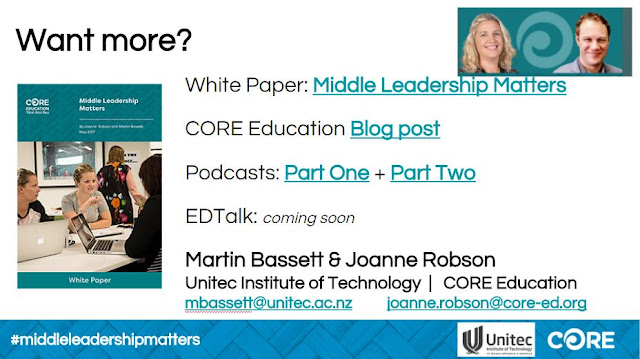Middle leaders as Instructional leaders in Aotearoa New Zealand schools: emerging data of role expectations and performance confidence
Martin Bassett & Joanne Robson with Prof. Carol Cardno, Arun Deo, Jo Howse
This afternoon we presented our emerging findings of recent research we have undertaken this year. The research focuses on middle leaders as instructional leaders, within Aotearoa, NZ.
You can access our presentation slides here
 |
| Discussing what they think the significant gaps between the role and performance confidence |
Teaching quality is indisputably acknowledged as the single most critical factor that has an impact on the engagement and achievement of students. Consequently, those with responsibility for assuring the quality of teaching delivery are themselves in the spotlight – which has moved from illuminating the role that school principals play as indirect instructional leaders to the role of the middle leader. It is leaders in the middle of school hierarchies, the department and subject heads in secondary schools and the curriculum and team leaders in primary schools who are now nominated in the literature as the performers of direct instructional leadership which occurs close to the classroom and involves direct interaction between the leader and the teacher.
In order to examine the nature of direct instructional leadership that has been devolved to levels beneath senior leadership in schools, quantitative data were collected to identify significant gaps related to middle-leaders’ perceptions of their confidence. A conceptual framework was designed to capture the nature and scope of direct instructional leadership as it could be practiced by middle leaders according to a synthesis of a range of studies and meta-analyses. The conceptual framework has six dimensions, bound together by a tight connection between what goes on in and near classrooms to foster student learning:
- curriculum
- teaching arrangements
- teacher appraisal
- teacher development
- evaluation of learning
- planning
Using an electronic survey, respondents were asked to rate the extent to which they were expected to carry out their role, alongside their confidence to perform their role. Descriptive data were used to analyse the strength of agreement by respondents, in relation to their role expectation, and performance confidence. Moreover, inferential data were analysed using chi square tests to statistically show the correlations between the role as instructional middle leaders, and their performance confidence. The aim of this presentation is to examine the emerging data analysis which show distinct differences between primary and secondary middle-level leaders in relation to their role expectations and their capability to perform their role. The implications for middle leadership in Aotearoa New Zealand will be discussed.
So what, now what?
We are excited to walk the talk - from promise to praxis. Based on our own experiences as middle leaders, we have created a partnership between CORE Education and Unitec Institute of Technology. By introducing an online course, specifically designed by middle leaders, for middle (and senior) leaders. This course leads into postgraduate studies in Educational Leadership and Management.
 |
| Check out previous blogposts: #middleleadersmatter
Hot off the press: our latest podcast #cenz17
|




Comments
Post a Comment